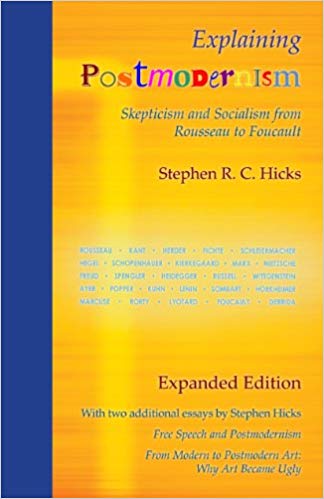Explaining Postmodernism Audiobook by Stephen R. C. Hicks

Stephen Hicks has written a trenchant and also intriguing publication on a crucial subject, yet I undertake this review with unwillingness. Explaining Postmodernism Audiobook by Stephen R. C. Hicks Download. I may release versus myself that direst of all fates for a reviewer– a profusion of important letters. The factor for my worry will emerge later on, yet to preserve suspense I will deal with some styles in guide out of the order in which the writer has placed them.
As befits a great thinker, Hicks informs us exactly what he indicates by postmodernism: “Metaphysically, post-modernism is anti-realist, holding that it is impossible to talk meaningfully about a separately existing fact. Postmodernism substitutes rather a social-linguistic, constructionist account of reality. Epistemologically, having declined the concept of an independently existing fact, postmodernism denies that factor or any other method is a way of acquiring direct expertise of that truth … Postmodern accounts of humanity are consistently collectivist, holding that individuals’ identities are constructed mostly by the social-linguistic groups they belong of … postmodern styles in values as well as politics are identified by a recognition with and also sympathy for the teams perceived to be oppressed in the conflicts, as well as a determination to enter the battle royal on their behalf” (pp. 6– 7, emphasis in original).
Who promotes this array of weird views? Hicks informs us that the “names of the postmodern lead are currently familiar: Michel Foucault, Jacques Derrida, Jean-François Lyotard, and Richard Rorty. They are its leading planners” (p. 1). Hicks additionally mentions one more team of “acquainted as well as typically infamous names” that aids the lead. He rightly consists of on his list the feminist thinker Luce Irigaray; yet, unlike our writer, her specialty is not “the objection of science” (p. 2).
Hicks does not commit much room to a thorough account of the different postmodernists he points out; he commits his principal focus to a general representation of the activity and also an account of its thoughtful genealogy. He does provide an outstanding short discussion of Derrida, for whom there is absolutely nothing past language. “Language attaches only with even more language, never ever with a non-linguistic reality. In Jacques Derrida’s words,’ [t] he truth of language is possibly the only fact to stand up to all parenthization.’ That is to state, we can not get beyond language” (p. 175). Elsewhere he calls attention to “Derrida’s ‘crossing-out’ device of using a word yet then the crossing it out to suggest that its use is ironical” (p. 73).
Behind Derrida lies Martin Heidegger, and Hicks offers an exceptional analysis of this greatly influential thinker.” [L] ike all excellent German thinkers, Heidegger concurred that when we reach the core of Being we will locate dispute as well as contradiction at the heart of points … Heidegger’s distinctiveness was his use of phenomenology … just as well as clearly describing the sensations of experience and also modification. On Heidegger’s account, what one locates when beginning so is a feeling of forecast into an area of experience and also change. Do not believe objects, Heidegger counsels, assume areas. Do not think subject, believe experience” (pp. 59– 60).
This new type of assuming challenged basic logic as well as reasoning “as merely one surface point of view– one that the Greeks had actually established fatefully for all succeeding Western idea” (pp. 62– 63). Rather, we should look for Being via “an exploratory letting go into the revelatory feelings of boredom, concern, shame, and also fear” (p. 63).
As will certainly be currently noticeable, Hicks does not believe in understatement; and also at one factor in his conversation of Foucault, he goes too far. Explaining Postmodernism Audio Book Stream. He claims that “Foucault extends his desire for effacement to the entire human species. At the end of The Order of Things, he talks virtually longingly about the coming erasure of mankind. Male is ‘an invention of recent date’ that will certainly quickly ‘be gotten rid of, like a face pulled in sand beside the sea'” (p. 195).
Hicks has right here checked out Foucault uncharitably. When Foucault predicts “the end of man,” he does not indicate that all human beings will quickly face extermination. Rather, he predicts the end of a specific perception of male– approximately, a conception based upon an universal human nature. The conception concerned had, in Foucault’s sight, a precise origin in time; as well as, equally as human beings long preceded this fertilization, so they might be anticipated to continue after that.